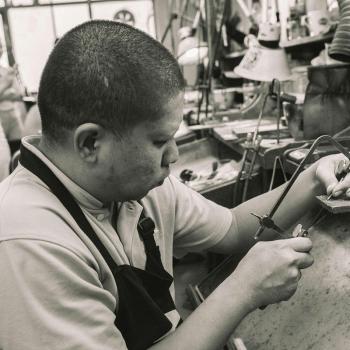When we read great literature, we expect the best heroes to have flaws. Whenever you read a story or watch a movie with a protagonist who seems to have no defects, it leaves you unsatisfied. You want your heroes to be human, so you can identify with them. Even superheroes that are too “good” can get kind of boring. So, what’s with this doctrine of the sinless Christ? If Jesus was sinless, can we completely identify with him, and he with us?

In this brief series, we’ll ask the question, “Was Jesus sinless?” This can mean different things to different people. Theologians from different schools of thought disagree on what we mean by sin. Before we discuss whether Jesus was sinless, we have to figure out what we even mean by asking the question. We’ll look at the doctrine of original sin and its relationship to corporate sin. Then we’ll look at individual sin as a separate consideration.
Original Sin
Put quite simply, the Christian doctrine of original sin states that every human inherits a sinful nature from our parents Adam and Eve. The New England Primer put it this way: “In Adam’s fall we sinned all.” According to this doctrine, every person is born automatically guilty of sin and in need of a savior. Just the simple act of being born condemns you, outside of the saving grace of God.
Original Sin and Sex
Those who profess original sin believe that the sinful condition is inherited through the sex act. Some even teach that semen carries sin. (No wonder the church has been so messed up throughout the centuries in terms of its preoccupation with sex!) According to this view, the man puts his sin into the woman, and she grows that sin into a human child who is sinful at birth. Hence the need for two ceremonies to help with this problem:
- Circumcision. Some Christians spuriously claim that the ritual of circumcision was a Jewish prototype for the covenant of Christ. In this view, the ring-shaped scar left by circumcision presages the wedding covenant between Christ and the church. As a symbol of eternity, this circular mark prophesies the day when Christ would redeem those born under original sin. Through the covenant of circumcision, the semen becomes sanctified as it passes through the scar-tissue ring of covenant. Of course, this superimposes a Christian reading over top of Hebrew scripture and tradition. This is dangerous territory, and we need to be careful interpreting a tradition as old as Abraham through a Christian lens. Another problem for those who believe in such things is that the Abrahamic covenant of circumcision is not enough. Something else is still needed.
- Infant baptism. While the original method of baptism (baptizo) was immersion, it wasn’t long before the church included infants in the ritual. This was out of concern for the souls of infants who died before they could be baptized as believers. Many who practice infant baptism believe this is a solution to original sin, as it welcomes babies as well as believers into the covenant of Christ. If infants are born with the stain of original sin, baptism washes it away.
Sin as Individual Decision
Many Christians reject the idea of original sin, saying that only an unjust God would hold all of humanity responsible for one sinful act committed by two progenitors. They say it’s not sin-guilt that we inherit, but a rebellious tendency that wins out every single time. They contend that the propensity for sin is so great that, as soon as a child is old enough, they will always choose sin. Instead of being guilty of someone else’s sin, they are guilty of their own. Christians who believe this have a different relationship with the rituals of circumcision and baptism.
- Circumcision. For those who believe sin is a rebellious act rather than a condition into which we are born, circumcision has no meaning beyond representing the covenant that God made with Abraham and his descendants. Many Christians still choose to circumcise their penis-bearing babies, out of tradition or some vague identification with the Abrahamic covenant. But for them, circumcision has nothing to do with original sin.
- Baptism. Christians who reject original sin typically practice believer’s baptism rather than infant baptism. They say that just as sin is a decision made by the individual, salvation is an individual thing. It is marked by receiving Jesus as your personal Lord and savior, followed by the individual’s decision to be baptized.
Was Jesus sinless?
So, when we ask whether Jesus was sinless, we must first ask what we mean by sin. Are we asking whether Jesus inherited original sin? Are we asking whether Jesus ever violated God’s law as a willful act of rebellion (sin of commission)? Or are we asking whether Jesus ever failed to do some good deed that he should have done (sin of omission)? Orthodox Christianity teaches that Jesus was sinless. But what does that mean?
Jesus is far more than a hero—but a hero he is, nonetheless. In fiction, a protagonist with no flaws is called a Mary Sue. Superman is one example—sure, he’s allergic to kryptonite and sometimes makes mistakes, but he is morally flawless and stands for truth, justice, and the American way. If you ask me, Superman’s moral flawlessness makes him a little boring. Similarly, if we expect Jesus to be sinless, we’re asking him to be a Mary Sue. Is there more to Jesus than a sinless superhero? Join me in my next article, and we’ll tackle that question.












